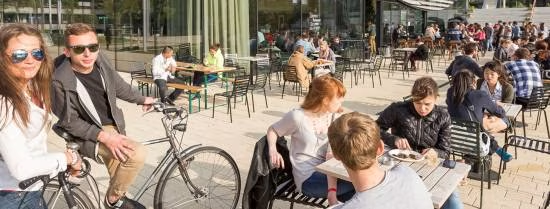Looking for a side-job as an international student with a non-EU/EEA nationality? There are additional regulations and legal restrictions to be aware of. Know your rights and your options, and you won’t run into any surprises!
Anything unclear in the below? Feel free to reach out.
Non-EU/EEA citizens registered as a student at a Dutch university are free to do a relevant internship during their studies. Although a work permit is not required, your internship provider must be able to present an internship agreement to the Labour Inspectorate upon request. This internship agreement must be signed by yourself, your internship provider, and the internship coordinator at the university. We highly recommend using this internship agreement template, provided by Study in NL.
Non-EU/EEA students are allowed to have a side job next to their studies:
- up to a maximum of 16 hours per week
OR
- full time during the months June, July and August.
In both situations a work permit is required (see next question).
Volunteering work
Non-EU/EEA International students and scientific researchers wishing to do voluntary work in the Netherlands, no longer need a work permit (TWV) to do so. Instead, the so-called Volunteer Declaration (Vrijwilligersverklaring) is now sufficient.
Information about the conditions and application procedure for the Volunteer Declaration can be found on the UWV website (please note that this page is in Dutch).
Only your employer can apply for the work permit before hiring you. The work permit must be applied for at the UWV Werkbedrijf, and the procedure will take approximately 5 weeks.
All in all the procedure is fairly uncomplicated, since it is not necessary to demonstrate that the job position cannot be filled by a Dutch or EU/EEA citizen. Please note that you cannot start working before the work permit has been issued. Starting earlier will result in your employer being fined by the government, and you losing your residence permit!
An orientation year is available for non-EU/EEA students who graduated from a Dutch university. During the orientation year you may work freely or do an internship/traineeship in the Netherlands (NL) while your employer does not have to apply for a work permit for hiring you.
More information
Check out Study in NL which describes all regulations regarding working while studying and you can download a flyer.
Get yourself a job or internship
Check the overview of vacancy websites and tips.
Take care of the practicalities!
Bank account, taxes, insurance, etc.
Want more information?
Visit one of the scheduled information sessions.
As a non-EU/EEA student..
also inform yourself on immigration.
Frequently Asked Questions
If you reside in the Netherlands on a student residence permit, you are allowed to work up to a maximum of 16 hours per week throughout the year, or fulltime in the summer months (June to August).
Only your employer can apply for the work permit before hiring you. The work permit must be applied for at the UWV Werkbedrijf, and the procedure will take approximately 5 weeks. There are some documents that need to be included with the application for a work permit. These can be checked on the UWV website, under ‘werkstudent’.
All in all the procedure is fairly uncomplicated, since it is not necessary to demonstrate that the job position cannot be filled by a Dutch or EU/EEA citizen. Please note that you cannot start working before the work permit has been issued. Starting earlier will result in your employer being fined by the government, and you losing your residence permit!
Yes, you can do an internship, as long as it is relevant for your studies. Please also check with your programme for all the options. It’s important to conclude an internship agreement before you start your internship.
If you want to do an internship after your studies, you are allowed to do so on an Orientation Year residence permit.
